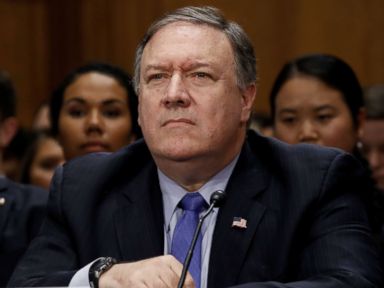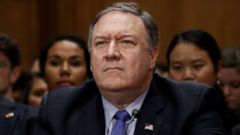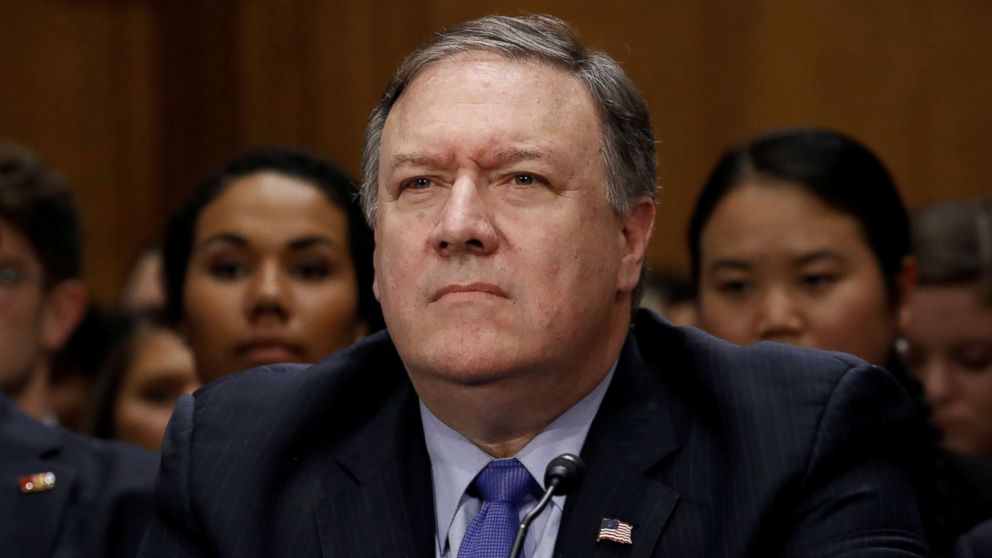






Secretary of State Mike Pompeo is defending the Trump administration’s foreign policy on Capitol Hill Wednesday, facing fierce questions from Republican and Democratic senators about North Korea, Russia, Iran, and more.
It’s Pompeo’s first time in front of the Senate Foreign Relations Committee after President Trump’s historic meetings with North Korean dictator Kim Jong Un and Russian leader Vladimir Putin – the outcomes of which are both now being called into question.
From the start, a stone-faced Pompeo engaged in tense exchanges with senators, starting with the committee’s ranking member, Sen. Bob Menendez, D-New Jersey, who pressed Pompeo on whether he knew what was discussed in Trump and Putin’s meeting.
“The predicate of your question implied some notion that there was something improper about having a one-on-one meeting. I completely disagree with the premise of your question,” Pompeo shot back, adding later that he had gotten a full readout from President Trump – and from Russian Foreign Minister Sergei Lavrov.
Amid questions about what was agreed to, Pompeo specifically pointed to coordination on counterterrorism and a possible business council as key outcomes from what he has described as “an incredibly important meeting.”
While senators from both parties criticized the administration for engaging with Putin despite his aggression in Europe and in cyberspace, Pompeo told the committee it was important to continue to keep channels open: “Now is the time for direct communication in our relationship in order to make clear to President Putin that there is the possibility, however remote it might be, to reverse the negative course of our relationship.”
Even as Trump has cast doubt on whether Russia interfered in the 2016 presidential election, Pompeo said he made clear to Russian officials in Helsinki that there will be “severe consequences for interference in our democratic processes.”
“President Trump is well-aware of the challenges that Russia poses to the United States and our partners and allies. He has taken a staggering number of actions to protect our interests,” Pompeo added.
Shortly before the hearing started, Pompeo also issued a statement to say the U.S. still opposes Russia’s “attempted annexation” of Crimea, which violates “a bedrock international principle shared by democratic states – that no country can change the borders of another by force.”
Trump had previously left the door open to the U.S. recognizing Crimea as part of Russia, telling reporters, “We’re going to have to see.” National Security Adviser John Bolton fanned the flames, too, in an interview with CBS News, saying again, “We’ll see,” and adding, “The president makes the policy.”
Over six weeks since the Singapore summit, with few demonstrable signs of progress on North Korea’s denuclearization, Pompeo also faced questions about the administration’s diplomatic push with North Korea.
Pompeo welcomed new satellite images released Monday that showed North Korea taking steps to dismantle key facilities at a missile testing site, saying the U.S. was tracking the “disassembly” of the site and calling it “a good thing” and “steps forward.”
“Progress is happening,” he added, but, “There’s an awful long way to go… There remains a great deal of work to do. It will be highly contested — that is, the modalities, the means, the timing of this will be things that I’m confident we’ll be discussing for a period of time.” Among those challenges, he confirmed, is that North Korea is continuing to produce fissile material.
While the Trump administration tore up the “strategic patience” that was the Obama administration’s policy, Pompeo added that because of those timelines they “are engaged in patient diplomacy, but we will not let this drag out to no end.”
It’s unclear how long they are willing to give talks.
Pompeo visited Pyongyang less than a month after the summit, but he was denied the meeting with Kim that the White House said he would have, and the North Koreans bashed the U.S. for making “gangster-like” and “cancerous” demands in their two days of meetings.
Downplaying those tensions, Pompeo told senators the U.S. knows the “truth” of those meetings and talks continue.
This is an ongoing story. Please check back in for updates.
